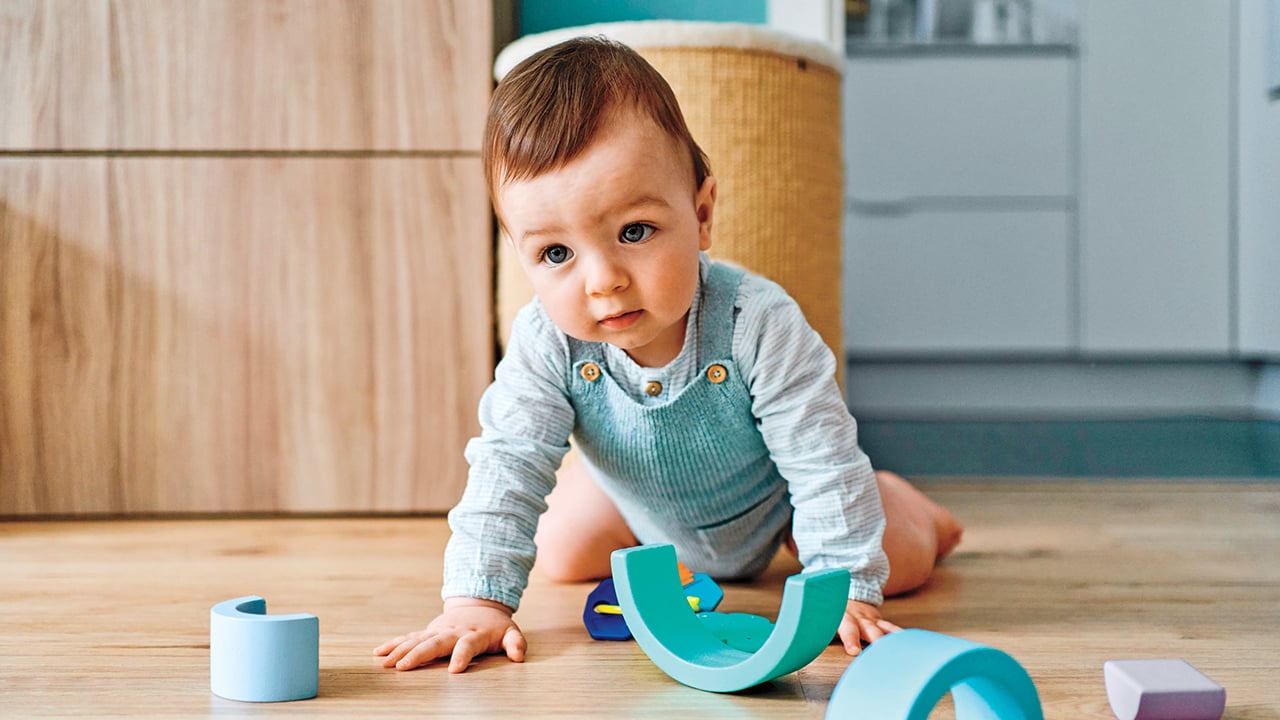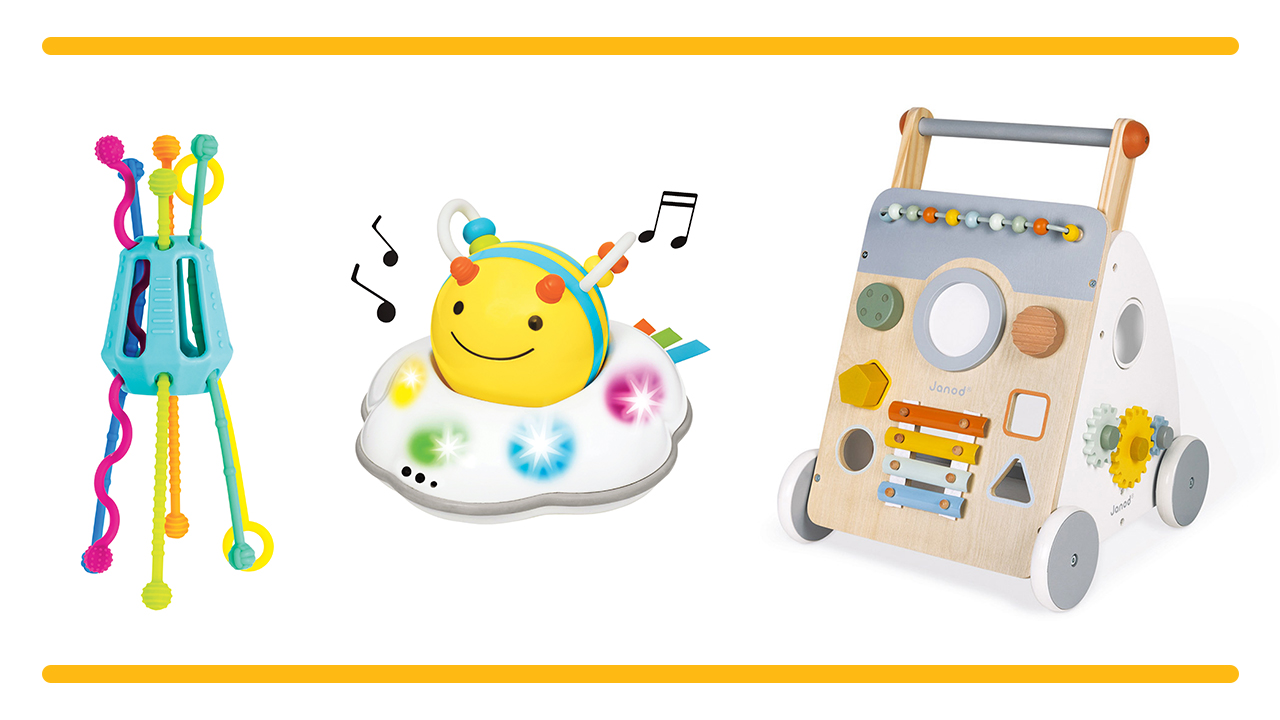
Play is how babies learn about themselves and the world around them. “It provides them with an opportunity to grow and develop by practising and mastering new skills. It is also a special way for parents and their baby to bond and spend time together,” says Caron Irwin, child life specialist, founder of Roo Family and child life specialist at Mastermind Toys. Toys, books and games that foster key developmental skills are an essential part of a baby and toddler’s world. Look for opportunities to enhance wonder, exploration, movement, language and all the other incredible skills that growing babies need to thrive. Here’s what you need to keep in mind when you’re picking out just the right items for your favourite little person.
Promote speech and language
When you talk to your baby, you are creating building blocks for language. It’s simple: read books, count things, point out colours, repeat sounds back to them when they say them, use gestures along with words, narrate what you’re doing (“and now we’re walking over to get your red shirt.”) Play simple games like peek-a-boo and patty-cake. For toddlers, ask lots of questions, listen to what they’re trying to say and say it back to them, describe what they’re doing (“you found the lion stuffy!”) and choose books that feature repetition. Great toys that encourage communication and interaction include nesting cups, blocks, vehicles, play food and bubble solution.
Foster social and emotional skills
Activities in these early days can help your baby and toddler learn and explore, form secure relationships, and work on the ability to manage emotions down the road (not now, that’s for sure!). Lots of loving cuddles and affectionate play while you use toys together are key here, as is naming toddler feelings to help them figure out what they’re experiencing. One approach that child development experts call “scaffolding” refers to following your child’s lead and providing a bit of support, so what they’re doing is challenging, not frustrating. (For example, giving a toy a nudge so an eager baby can reach it, rather than simply handing it to them.) Offer safe places to explore, like a play house or play tunnel.
Boost fine motor skills
Simple toys and objects are an excellent way to help them grow and develop the small muscles in their hands. Between eight and 12 months of age, your baby will likely be able to pick up and drop toys, bang two items together and put things into a container with a large opening and take them out again, so toys that small hands can grasp (but not swallow) are a good choice. By the time your baby is 12 to 18 months old, they will be interested in scribbling on paper with a chunky crayon and stacking a block or two on top of another. They will also start to point to pictures in books, so choose books with appealing images. Toy ideas for 18 to 24 months include blocks again, a toy sorter with large shapes, and a “busy board” that has features like large knobs to turn, pegs to fit into holes and a chunky zipper.
Help gross motor skills
Moving and developing the big muscles in the arms, legs and torso starts with tummy time. While various tummy time activities start in those early newborn weeks, the floor time on their bellies, without props, is generally recommended for three- and four-month olds, so it’s great to have some interesting toys or a baby-safe mirror to entertain them while they’re on their bellies. Sitting up starts around six months, and again playtime with toys helps keep them interested, so try a small ball to roll back and forth. As baby grows to nine months and beyond, look for toys like stand-up walkers and small activity tables so they can practice those standing and cruising skills. Toddlers will love ride-on and pull toys too, as well as active games that encourage the new, wobbly skills of jumping with both feet, dancing and running.
Inspire thinking and reasoning
Also known as “cognitive skills,” this is all about the way your baby or toddler learns to think, solve problems, imagine, gather information, remember, and develop judgement—pretty impressive! Reading together, as well as dancing, playing music and singing helps promote these skills and every age. Provide a variety of toys in different textures, shapes, sounds and colours to keep that brain growing. Six- to nine-month olds will also love hide-and-seek games with a stuffy or puppet. By 12 months, your little one may like to use a pretend phone, and explore objects in many ways by shaking, throwing and dropping them. By 18 to 24 months, they may be interested in pretend play like a play kitchen and food, simple puzzles with up to four pieces, and washable non-toxic art supplies like crayons and paint.
For growing babes
Combine fun and foster important developmental skills with toys that help little ones discover the world around them.
Made with soft, flexible silicon, this baby toys is perfect for gripping, tugging and chewing. And, pulling the cords creates exciting sounds and vibrations. Mobi Zippee Activity Toy, $25, mastermindtoys.com
Young crawlers will be fascinated by this gentle, encouraging toy that moves and buzzes. Skip Hop Explore and More Follow-Bee Crawl Toy, $37, mastermindtoys.com
This cool walker does double-duty: it helps kids practice their first steps, plus features plenty of fine-motor activities to explore. Janod Sweet Cocoon Multi-Activity Baby Walker, $100, mastermindtoys.com
A version of this article appeared in our September/October 2021 issue, titled “Play, baby, play,” pg. 32.
The post Why play is important for baby development appeared first on Today’s Parent.

 PARENTING TIPS
PARENTING TIPS PREGNANCY
PREGNANCY BABY CARE
BABY CARE TODDLERS
TODDLERS TEENS
TEENS HEALTH CARE
HEALTH CARE ACTIVITIES & CRAFTS
ACTIVITIES & CRAFTS



